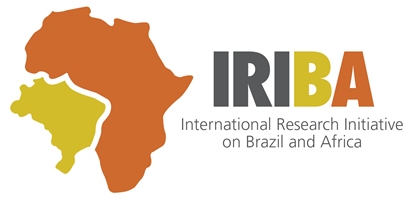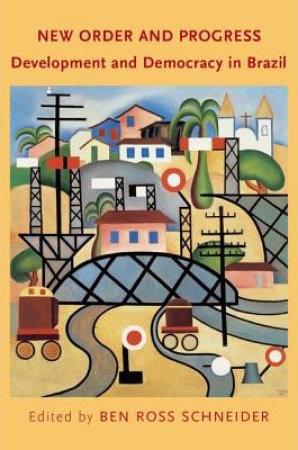As presented at our 2016 Rio de Janeiro findings workshop by IRIBA researchers José Afonso and Bernardo Fajardo.
Listen in Portuguese:
(more…)
IRIBA research has been included in New Order and Progress. Development and Democracy in Brazil. The title documents the economic rise of Brazil from a variety of historical, comparative and theoretical viewpoints, and asks why the country has not been able to sustain its climb.
Francisco H.G. Ferreira, Sergio P. Firpo and Julian Messina’s chapter ‘Understanding Recent Dynamics of Earnings Inequality in Brazil’ presents an alternative interpretation of Brazil’s impressive growth record between 1995 and 2012. The authors highlight the importance of demographic, spatial and institutional factors in explaining the decrease in earnings inequality over the period, rather than attributing it chiefly to the success of the Bolsa Família, as is commonly done.
Read the Working Paper the chapter is based on, ‘A more level playing field? Explaining the decline in earnings inequality in Brazil, 1995-2012‘.

Federal government departments neatly lined up on the Esplanada dos Ministérios in Brasília. Photo by author.
Much of IRIBA’s research has been cautiously optimistic, analysing changes that saw Brazil embark on a path of pro-poor growth and consolidate its newly redemocratised institutions. Now, the distinctive development ‘model’ that emerged in the early 2000s faces its first major challenge, in the shape of the current political crisis.
A key aspect of this crisis is corruption; widespread, elite-level, blatant, endemic. As this working paper details, the main corruption problem in Brazil is ‘grand’ corruption, as opposed to petty street-level shakedowns. This is bad for business, growth, government performance, social solidarity, inequality, democracy. Corruption is bad news. However, in Brazil, extremely low conviction rates have historically meant almost de facto impunity.
Matters have recently come to a head. While economic downturn is one tidal force behind the wave of general dissatisfaction that culminated in the removal of President Dilma Rousseff in mid-2016, the more proximate cause is public disgust at a conveyer belt of sordid revelations of greed, dishonesty and abuse of power among Brazil’s political and business elite. The media has succeeded in corralling much of the outrage in the direction of the Worker’s Party (PT, in power 2003-16), but the situation is not that simple. Corruption is rife across the political landscape; no less than 48% of senators and 55% of federal deputies face corruption charges, as do many business figures. New President Temer and allies face considerably more serious and personal corruption allegations than Rouseff.
Each new day seems to bring another bombshell from the Lava Jato anti-corruption probe, with a demoralising and sickening effect on the public. Sat in stationary traffic in Rio de Janeiro recently, my taxi driver looked up from the latest of these allegations, splashed across his newspaper, to declare that the only solution was probably the return of military dictatorship. Is he right?! Let’s hope not. One strand of IRIBA’s research has analysed both the extent and nature of corruption in Brazil, as well as efforts to tackle it – which are beginning to show ‘green shoots’. These in turn suggest ways forward, and also hold potential lessons for other countries fighting similar problems.
In this article for the special issue journal collating much of IRIBA’s research, Lindsey D. Carson and Mariana Mota Prado shed light on both how to understand corruption in Brazil and elsewhere, and what to do about it. Corruption, they argue, has typically been conceived as a ‘principal-agent problem’. This picture involves a ‘principal’ (P), who entrusts an ‘agent’ (A) with power. The principal could be a higher-ranking superior in a department or in a business, but could also be the public insofar as the public bestows elected officials with power. In this model, cases of corruption occur when the principal lacks sufficient information to oversee the agent’s activity, and thus the agent is unaccountable and is able to abuse their power. So, a member of staff hoodwinks their boss, or a government minister trousers campaign finance unbeknownst to voters. Consequently, measures informed by this model have aimed at changing the behaviour of and incentives open to ‘agents’.
However, as Carson and Prado argue, there are major questionable assumptions here. One is that the ‘principal’ is well-intentioned, whereas the ‘agent’ acts out of pure self-interest. What about cases where, for instance, the CEO (‘P’) of a private company that takes on government contracts actually benefits from and facilitates corrupt practices among subordinates (‘A’s)? A second questionable assumption is that, in cases where the power-entrusting ‘P’ is the public, when a politician’s misdeeds become widely suspected, he will be held accountable; for instance, by removal from office. But what if the public sees little point in booting out particular corrupt politicians because the replacements queueing up are just as bad? In other words: what about when everybody’s at it?
In such cases, the authors argue, corruption has become systemically endemic, and we face not a principal-agent problem, but a collective action problem. In this sort of scenario, a strategy that appears to be individually beneficial contributively leads to an outcome that is collectively inferior. Society overall would be better off if all individuals eschewed corruption, but particular individuals making a lonely stand might well be worse off. Partially this has an intersubjective basis; everybody expects everybody else to engage in corruption. For any individual, taking the leap of faith into more principled behaviour threatens significant costs – ostracism; risks of tackling the powerful; foregoing access to resources that competitors access corruptly – with few benefits. Even somebody who might otherwise ‘want’ to act honestly may well not, under these constraints. As such, framing this as a collective action problem helps us understand how corruption can become a durable and self-reinforcing feature of a society.
It also helps identify different possible anti-corruption strategies. In particular, Brazil’s recent experience suggests the possible benefits of ‘institutional multiplicity’ in anti-corruption. Institutional multiplicity is where multiple institutional arrangements or options exist within a given field, such that different institutions’ functions may overlap, duplicate, or even compete with one another. This is not necessarily a positive feature, and in some contexts is argued to lead to inefficiencies and conflict.
However, Carson and Prado argue, in the case of endemic corruption, institutional multiplicity can help fight the problem – now re-understood as a collective action problem. Powerful stakeholders may be invested in existing institutional status quos and have little incentive for change, but institutional multiplicity can develop subtly without risking intense political resistance from such vested interests. Moreover, it reduces the need for powerful ‘champions’ in existing elites to step forward and lead anti-corruption drives, by making it easier for less powerful actors to strategically move around different institutions to effect change. This is particularly useful given the possibility of an organisation with a monopoly on anti-corruption efforts itself becoming compromised. Institutional multiplicity also can mean simply more likelihood of catching offenders, and that potential offenders are threatened with an overlapping array of possible sanctions. Functional overlap may be the best strategy in the face of the inherently complex and secretive phenomenon that is corruption.
This is, of course, not a silver bullet, but, as the paper argues, in Brazil’s case the initially rather uncoordinated simultaneous empowering of several anti-corruption institutions has actually bolstered anti-corruption efforts, fostering collaboration, complementarity and positive reinforcement among initiatives.
The current crisis is painful and demoralising for Brazilian citizens. In particular, former president Lula is the figurehead of significant advances against poverty and inequality, and left office in 2010 with approval ratings almost unheard of for political leaders anywhere in the democratic world. He remains a much-loved icon for many. Should the ongoing investigations into his affairs during and after the presidency reveal significant wrongdoing, serious emotional hurt would be inflicted on the national psyche. Even if they don’t (he denies all charges), trust in political leaders and institutions in general is at rock-bottom.
However, a crumb of comfort may be found in the fact all this might at least reflect what Carson and Prado term the anti-corruption ‘web of accountability’ attaining effectiveness, thanks in part to its institutional multiplicity. In my personal view there are also irreducibly political factors that further complicate the picture: what interests drive particular anti-corruption movements, targetting whom, at what time, and why? But, at least, Brazilians should have no need to call for the military anytime soon.
—
Chris Lyon is a PhD candidate at the Global Development Institute. The working title of his thesis is Exploring a relational conception of social justice: liberals, radicals, and Brazil’s ‘new social contract’. Read more by Chris.
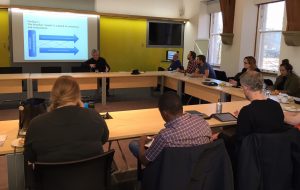 Prof. Ed Amann and Prof. Armando Barrientos gave a presentation on November 25 on some of the central findings of the IRIBA research.
Prof. Ed Amann and Prof. Armando Barrientos gave a presentation on November 25 on some of the central findings of the IRIBA research.
They discussed how Brazil’s comparatively successful development performance over the last two decades has been based on a pattern of inclusive growth, that combined progressive social policy and increased labour market inclusivity with fiscal responsibility. However, such a ‘model’ as has existed has been a blend of “consensus and conjecture”, arising partly as innovative responses to particular historical circumstances. The seminar discussion also covered questions about the future of this development trajectory given the current political crisis.
Read the journal article that summarises our key findings.
Watch the talk:
Read the slides:
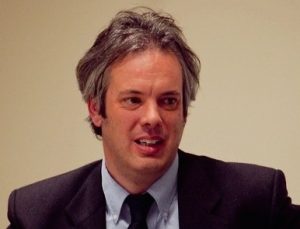 Ed Amann is Professor of Brazilian Studies at Leiden University Institute for History, and co-led the IRIBA project with Armando Barrientos. He reflects here on our research findings, and makes a few forecasts in light of new developments in the political climate in Brazil – and globally. (more…)
Ed Amann is Professor of Brazilian Studies at Leiden University Institute for History, and co-led the IRIBA project with Armando Barrientos. He reflects here on our research findings, and makes a few forecasts in light of new developments in the political climate in Brazil – and globally. (more…)
 Inclusive growth doesn’t come out of nowhere. IRIBA’s Professor Armando Barrientos explains the ways in which socially-oriented policy decisions led to economic growth that primarily helped to increase the incomes and wellbeing of Brazil’s poorest, rather than that of elite groups, over the course of the 2000s.
Inclusive growth doesn’t come out of nowhere. IRIBA’s Professor Armando Barrientos explains the ways in which socially-oriented policy decisions led to economic growth that primarily helped to increase the incomes and wellbeing of Brazil’s poorest, rather than that of elite groups, over the course of the 2000s.
*
Social policy has emerged as a core component of the Brazilian development model, making an important contribution to the reduction of poverty and inequality, and therefore to inclusive growth. Education and welfare reforms in the 1990s, followed by a rapid expansion of antipoverty transfers and changes in minimum wage policy in the 2000s, are the main components.
Despite recent setbacks, Brazil has emerged as a significant economic power in the last two decades, combining accelerated growth with falling poverty and inequality. The pro-poor character of economic growth and declining levels of inequality in Brazil over this period stands in marked contrast to the experience of other countries. Based at the Global Development Institute, IRIBA brought together an international team of researchers to ask whether there is a Brazilian model of development, and to investigate the nature and sources of the country’s inclusive growth performance.
Please join us at 12pm on November 25, 2016 in the Ken Kitchen Committee Room, John Owens Building (University of Manchester) as Professors Ed Amann and Armando Barrientos outline the key findings of our research, and their implications for the future. We will be celebrating the launch of a special edition of The Quarterly Review of Economics and Finance, which collates the papers produced through IRIBA.
Please register here for tickets and share the event with those who may be interested. Lunch will be served.
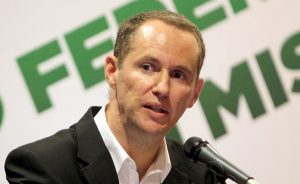 Brazil’s Bolsa Família programme has been credited with helping to significantly reduce levels of absolute poverty and inequality in Brazil. Started in 2003, and funded by less than 0.5% of the country’s GDP, it now facilitates small cash transfers to 46 million Brazilians whose current income places them below the poverty line. By providing the transfers, which require school attendance and health checks for children, Bolsa Família helps to support families in times of hardship, including against unexpected economic shocks and fickle labour markets.
Brazil’s Bolsa Família programme has been credited with helping to significantly reduce levels of absolute poverty and inequality in Brazil. Started in 2003, and funded by less than 0.5% of the country’s GDP, it now facilitates small cash transfers to 46 million Brazilians whose current income places them below the poverty line. By providing the transfers, which require school attendance and health checks for children, Bolsa Família helps to support families in times of hardship, including against unexpected economic shocks and fickle labour markets.
Luis Henrique Paiva worked on Bolsa Família for five years, running it for three. A permanent civil servant, Luis has worked in the Brazilian public administration since 1998, including for the Chief of Staff in the Brazilian presidency between 2005 and 2007. He currently works as a researcher at the Institute for Applied Economic Research (Instituto de Pesquisa Econômica Aplicada – IPEA), with a focus on pensions and non-contributory social programmes. We asked him to reflect on the success of Bolsa Família, and the implications of Brazil’s current recession and recent political turmoil for the longevity of the programme.
IRIBA’s research has argued that in recent decades Brazil has followed a distinctive development trajectory. This has centred on inclusive growth and the use of innovative tax-financed social policy in reducing poverty and inequality and bolstering long term human development. However, current events are rather more bumpy, including a bona fide political crisis of dizzying proportions. What is going on and what might be the implications for development? I’ll take those in turn. Firstly, a not-entirely-impartial synopsis:
What is happening politically?
Professor Werner Baer was a vital member of the IRIBA team, and we were shocked when he passed away after a short illness earlier this year. The Jorge Paulo Lemann Endowed Chair in Economics at the University of Illinois at Urbana-Champaign, Werner was a giant in Brazilian Studies and his book The Brazilian Economy: Growth and Development, now in its 7th edition, remains essential reading for anyone interested in the country.
In honour of his memory, a special issue of The Quarterly Review of Economics and Finance has been dedicated to Professor Baer. The idea of this open access Special Issue initially came from him and is based on the IRIBA research.
As the dedication says:
“Over his long and varied career, Werner established a reputation as one of the world’s leading experts on the economics of Brazil. His initial work starting in the late 1950s focused on the issues of structural transformation and industrialization. The 1970s and 1980s saw a series of publications in leading journals in which Werner explored the vital policy issues of the day, among them the debt adjustment crisis and the transition from military to civilian rule. More recently, Werner’s research shifted focus, analyzing the Brazilian economy as it addressed globalization while simultaneously tackling ingrained poverty and inequality.”
For the IRIBA project, Werner Baer was looking at Brazilian infrastructure issues. He discussed his take on Brazil, and the project, in a visit to Manchester in 2014:
© IRIBA 2014 | All rights reserved I Google+
Hosted by The Brooks World Poverty Institute
